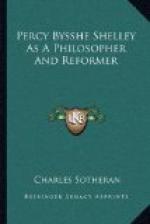When Shelley arrived in Dublin in 1812, he soon found himself joined to the body of the Repeal party, which was endeavoring to obtain back the parliament which had been stolen from them by British gold, less than a quarter of a century before, and to have the Catholic Emancipation Bill made law. He published two remarkable, political pamphlets, in those days the only mode by which a statesman could appeal to the people, in which it may be noticed how well he could write in a popular style, to effectually serve a purpose. They also prove his enthusiasm for the liberty of discussion, and how, although he was always willing to treat on politics alone, he was preoccupied with metaphysical questions which continually crop out.
In the first, which he called An Address to the Irish People, and wrote during the first week of his residence in Ireland, he commences by eulogizing the Irish, explains to them that all religions are good which make men good, and shows that, being neither Protestant nor Catholic, he can offer the olive branch to each. He then points out the weak spots in each other’s conduct in the past, the necessity of toleration, and the crime of persecution—how different this was to what Christ taught!
He endeavors to prove that arms should not be used—that the French Revolution, although undertaken with the best intentions, ended badly because force was employed. He recommends sobriety, regularity and thought; for the Irish not to appeal to bloodshed, but to agitate determinedly for Catholic emancipation and repeal, which should be ensured through the use of moral persuasion. And concluding with an appeal to Catholic and Protestant to bear with each other, using mildness and benevolence, and to mutually organize a society which
“Shall serve as
a bond to its members for the purpose of
virtue, happiness, liberty
and wisdom by the means of
intellectual opposition
to grievances,”
he winds up by saying:
“Adieu, my friends! May every sun that shines on your green island see the annihilation of an abuse, and the birth of an embryon of melioration! Your own hearts—may they become the shrines of purity and freedom, and never may smoke to the Mammon of Unrighteousness ascend from the polluted altar of their devotion.”
In a postscript to this pamphlet, he urges
“A plan of amendment and regeneration in the moral and political state of society, on a comprehensive and systematic philanthropy which shall be sure though slow in its projects; and as it is without the rapidity and danger of revolution, so will it be devoid of the time-servingness of temporizing reform;”
and quotes Lafayette:




